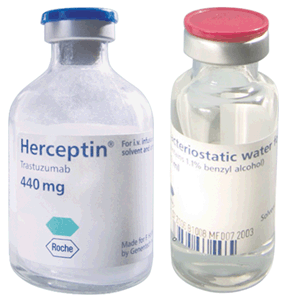 The effective breast cancer drug Herceptin can be administered in a way that greatly reduces one of its most serious side effects, a risk of heart damage, according to a study published Wednesday in the New England Journal of Medicine.
The effective breast cancer drug Herceptin can be administered in a way that greatly reduces one of its most serious side effects, a risk of heart damage, according to a study published Wednesday in the New England Journal of Medicine.
Herceptin targets a protein called Her2 which appears on the surface of the cancer cells in about one quarter of breast cancer patients. As a result of the Her2 protein, women who develop that type of cancer often have a more aggressive form. Previous studies, confirmed by the latest one, have found that if Her2 positive patients get Herceptin together with a chemotherapy drug soon after the initial surgery — called adjuvant therapy — their chance of a recurrence drops by about 50 percent. That discovery is one of the greatest successes in the history of breast cancer research.
Most doctors give Herceptin together with the familiar chemotherapy drug called adriamycin. Adriamycin by itself increases the risk for heart problems, including heart failure and even death. Combined with Herceptin, the heart risk is greater.


